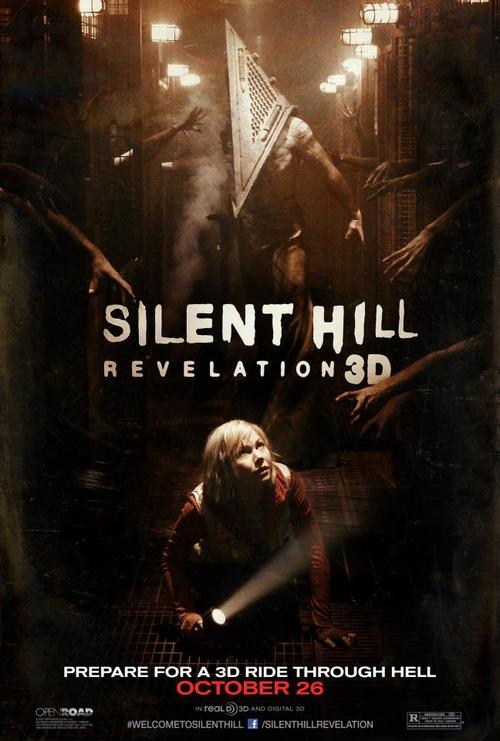 Allow me to introduce myself: I’m that guy who loves the first Silent Hill.
Allow me to introduce myself: I’m that guy who loves the first Silent Hill.
I am well aware that it’s a film that runs roughshod over the fundamentals of plotting, acting, and logic. It’s a deeply flawed film, objectively. I am also aware of my own bias, as someone who has long been able to forgive the games the film is based on for more or less the same reasons.
And yet, I love it, because it is 2 hours of nothing I have been able to see from the current horror film landscape. That’s not to say I don’t give your run-of-the-mill well executed slasher or B-horror flick any love whatsoever. It all has its place. However, in the very literal sense, Silent Hill is the horror movie of my dreams: It’s a film full of the things that actually scare me, presented at a elegiac, gentle, dreamlike gait that made the moments of savage, ugly, contorted, industrialist dread work on me all the more. It’s not blood, guts, gore, or jump scares. It’s not even so much the fear of death. It’s the terror of being trapped, alone, with no respite, in a place where everything is all at once familiar, and entirely, brutally, undeniably wrong. THAT’s true horror for me, and I can count on one hand the number of films that fit that bill.
In the sense that Silent Hill Revelation gives me more of that, it’s a success. It’s still unlike nothing else floating out there. In the sense that it’s in service of storytelling good enough to forgive its failures like its predecessor, it is decidedly lesser.
In Revelation, Rose (Radha Mitchell, relegated to cameo status here) somehow managed to luck out while being trapped in purgation at the end of the first film, getting her hands on an artifact allowing her to push Sharon back out to the real world to the loving arms of her father. Since then, however, the two of them have been stalked by deranged cult members who want the Artist Formerly Known As Alessa back in Silent Hill, resulting in the two of them moving around constantly, a couple of name changes (Sharon and Chris are now Heather and Harry Mason. And gamers did rejoice.), and a healthy dose of paranoia.
Fast forward a few years. Sharon Heather (Michelle Williams Adelaide Clemens) is now 18. Chris Harry gets abducted, with a message in blood waiting at home telling Heather to go to Silent Hill, which she does, despite a ridiculous amount of warnings that it’s probably a bad idea.
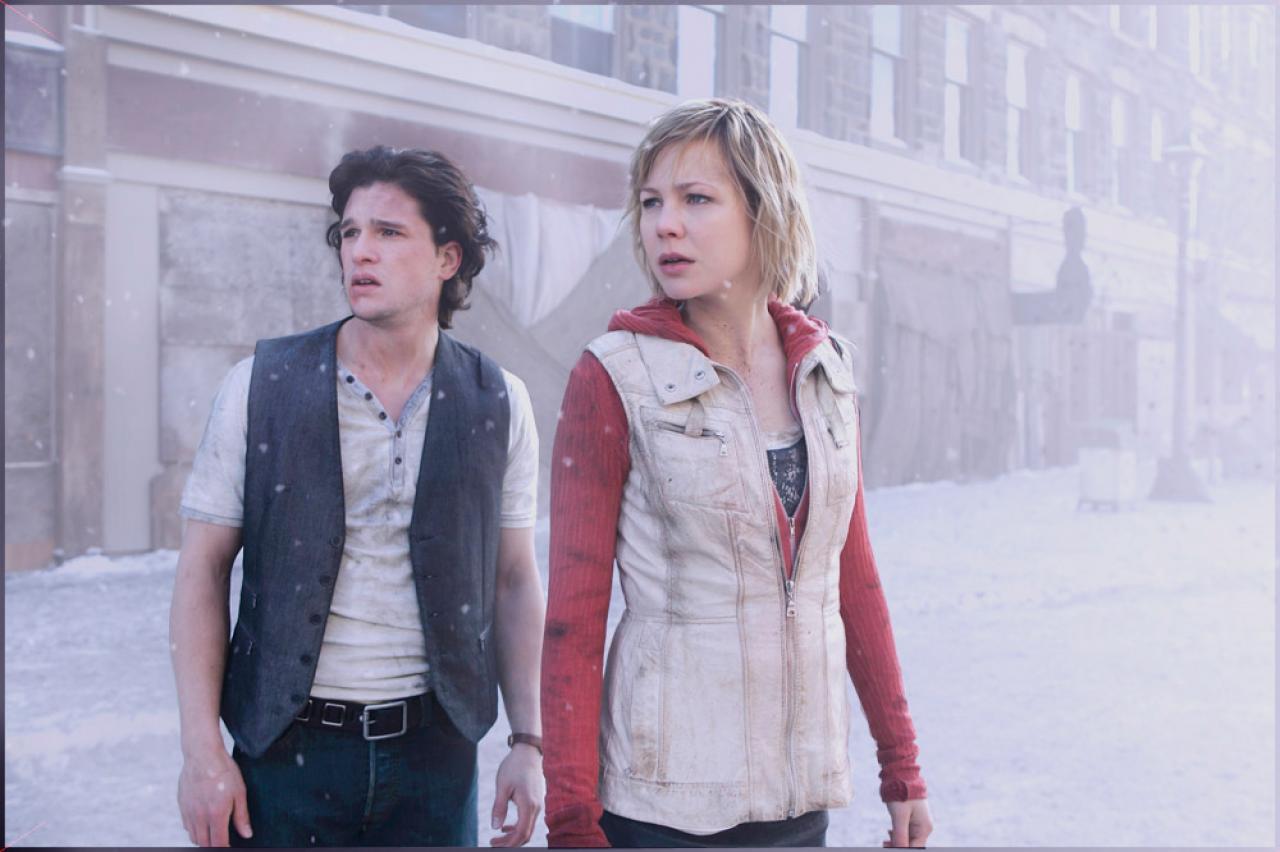 For the unfamiliar, that entire plot is nearly carbon copy of the game Revelation is based on (Silent Hill 3) with the exception that Radha Mitchell’s character doesn’t exist there, and Harry’s dead as Dino DeLaurentiis by the time Heather gets the invite to Silent Hill. And while fidelity to the games is commendable, the first film also benefitted from taking the threadbare plot of game 1, and doing its own thing. It resulted in an interesting, if not fully fleshed out, subtext about motherhood and religion that Chris Gans and Roger Avary were able to utilize for extra thematic mileage. We were watching a mother fail as a guardian for her child. Every moment of horror we got fed off the nightmare of that failure.
For the unfamiliar, that entire plot is nearly carbon copy of the game Revelation is based on (Silent Hill 3) with the exception that Radha Mitchell’s character doesn’t exist there, and Harry’s dead as Dino DeLaurentiis by the time Heather gets the invite to Silent Hill. And while fidelity to the games is commendable, the first film also benefitted from taking the threadbare plot of game 1, and doing its own thing. It resulted in an interesting, if not fully fleshed out, subtext about motherhood and religion that Chris Gans and Roger Avary were able to utilize for extra thematic mileage. We were watching a mother fail as a guardian for her child. Every moment of horror we got fed off the nightmare of that failure.
Revelation‘s writer/director, Michael J. Bassett, isn’t that ambitious. He settles for letting the plot play as it lays. It’s less of the surreal, subconscious fever dream the first film was, more of a straight up horror fantasy, where it’s essentially a heroine venturing into darkness up with a dark prince trying to go good against an evil sorceress. Except there’s cannibals and vaginafaces involved. The game does that disservice too, handing us that plot coming off the thematic brilliance of Silent Hill 2. But even there, there’s a creepy undercurrent in that game involving a teenage girl’s right to choose, and religion’s role in that, and that undercurrent is nowhere to be found here. So, at it’s absolute best–which is to say, when it’s just Heather hopscotching between increasingly fucked up versions of reality–it plays like a nicely pitch black fairy tale. Like Dario Argento remaking Labyrinth. It’s less scary, less deep, but still compellingly disturbing. Bassett hits the right notes when it counts, relying any visual trick he can to get the audience off their guard, as well as settling for good old fashioned fucked-up. There’s a sequence involving mannequins, and two unfortunate girls unlucky enough to get stuck in town that is truly the stuff of nightmares, and maybe the standout visual of the film.
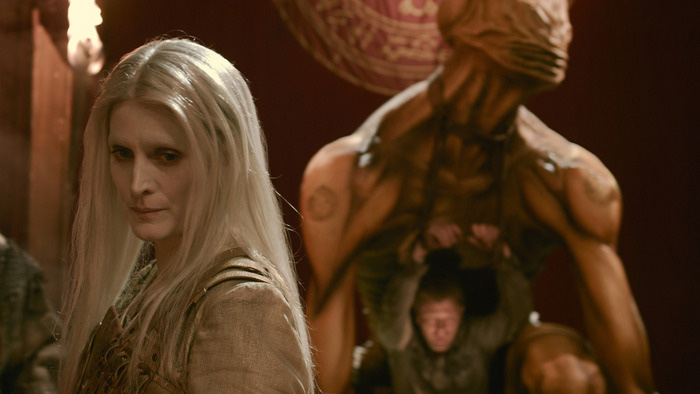 At its worst, however, it’s a prime example of the worst aspects of DTV. It spends way too much time recapping the first film, and firing off unnecessary exposition. There’s not nearly enough time spent making the audience care that
At its worst, however, it’s a prime example of the worst aspects of DTV. It spends way too much time recapping the first film, and firing off unnecessary exposition. There’s not nearly enough time spent making the audience care that Chris Harry’s been taken, about the cult that took him, or why they’re any more of a threat than the abominations that haunt the town. Silent Hill 3 was able to do that. The video game had more character development than the film. Cardinal video game adaptation sin #1.
It also doesn’t help that the film doesn’t make nearly the aural mark the first did. For a game series and first film for whom the music and sound design are damn near the lifeblood of the whole thing, for Jeff Danna to decide to forgo the vast array of still-unused Akira Yamaoka tracks from the games in favor of reworking the same 4 or 5 is an unforgivable crime. The same goes for hiring people like Malcolm McDowell and Carrie-Anne Moss, and letting Deborah Kara Unger reprise Dahlia from the first film and relegating them to maybe 5 minutes screentime each. Same goes for letting Pyramid Head run around and then essentially turn him into Godzilla in act 3.
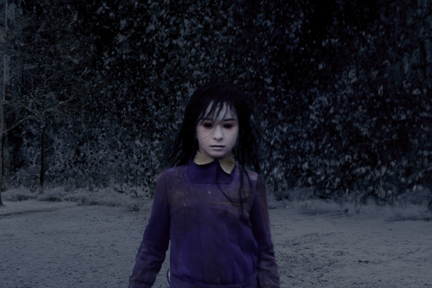 This is a running theme for the whole film. Bassett has the right pieces in place here, and for protracted moments–Heather’s introduction to her high school class, her first walk through Silent Hill, the whole sequence with McDowell’s Leonard Wolf, Heather confronting Alessa on a burning merry-go-round–it’s exactly what it should be. It’s the kind of grand horror journey I always wanted Hellraiser to become after II, and it’s very easy to get sucked into it. Bassett simply does not have the tools to make any of it stick in the mind after it plays out. It’s immemorable in ways the disparate elements ported over from the games are not, ignoring a much wider swath of things from the film and the series that aren’t as well.
This is a running theme for the whole film. Bassett has the right pieces in place here, and for protracted moments–Heather’s introduction to her high school class, her first walk through Silent Hill, the whole sequence with McDowell’s Leonard Wolf, Heather confronting Alessa on a burning merry-go-round–it’s exactly what it should be. It’s the kind of grand horror journey I always wanted Hellraiser to become after II, and it’s very easy to get sucked into it. Bassett simply does not have the tools to make any of it stick in the mind after it plays out. It’s immemorable in ways the disparate elements ported over from the games are not, ignoring a much wider swath of things from the film and the series that aren’t as well.
Along with two cute little tips of the hat to Silent Hill Origins and Downpour, the film ends with a 100% guarantee that we’re getting an adaptation of Silent Hill 2. There’s enough that’s interesting and enjoyable about Revelation to make me really excited about that proposition, while simultaneously making me scared shitless, if we’re more concerned with continuing the first film’s aesthetic, not its maturity and visceral restraint. The film just called the series’ shot, Babe Ruth-style, that we might be seeing one of the best horror stories in a moving medium adapted into a film. Revelations does a grand job of convincing me that that film absolutely should still happen, and that Michael Bassett is not the guy I want making it.
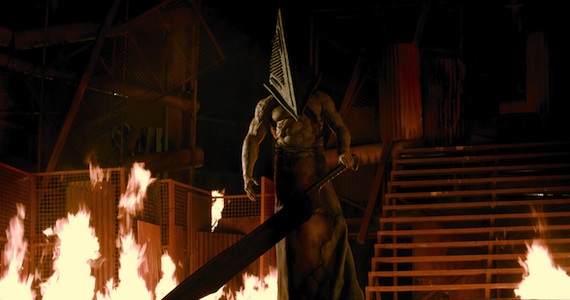
Rating:



Out of a possible 5 stars